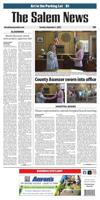The morning of Wednesday, Sept. 3, City Administrator Sally Burbridge released a statement on a petition for a state audit circulating within the City of Salem. If enough signatures are acquired and verified, a state audit would likely begin reviewing the city’s most recent annual audit, then begin looking for any fraud and look at internal policies to ensure the city is following them.
Signatures are currently being collected from “qualified voters”, defined as, “a voter who is registered and a resident of the political subdivision at the time they sign.” Based on the election information available from the local election authority, the number of signatures required for a petition audit of the City of Salem is a minimum of 278.
The most recent state audit was completed on the City of Salem back in 2010—during which, there were no findings of fraud; however, there were recommendations made in the 25-page audit report.
The city administrator’s statement is as follows:
“Regarding the petition for a State Audit of the City of Salem, I want to be clear that we welcome opportunities to strengthen our processes and improve services for our citizens. My concern is not with the value of oversight, but with the significant cost that would ultimately be borne by our residents.
A State Audit is estimated to cost between $80,000 and $125,000. To put that in perspective, this is comparable to projects already included in our budget that directly benefit the community:
• $120,000 – annual street paving
• $100,000+ – utility billing and citywide financial software upgrades (a need identified for years)
• $109,000 – annual debt payments for the pool
• $110,000 – half the cost of paving the T-Ball parking lot at City Park
• $88,900 – the upgraded storm siren system recently approved
• $103,411 – annual debt payments for the Water Utility
While not all of these items come directly from the General Fund (where the audit cost would be incurred), they illustrate the types of projects and obligations an audit of this size could displace.
Ultimately, my responsibility as City Administrator is to ensure taxpayer dollars are used in ways that provide the greatest benefit to our community. That is the lens through which I view this potential expenditure.”








